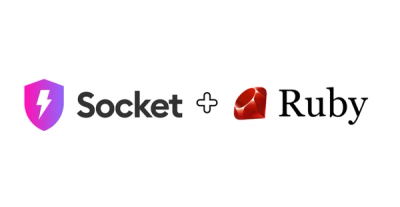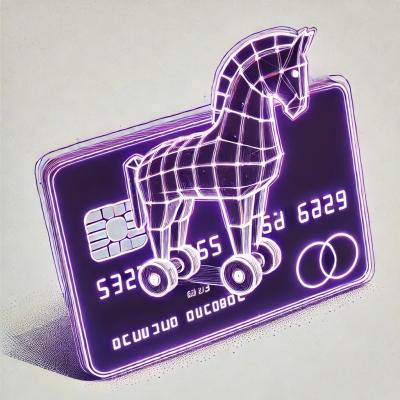
Product
Rubygems Ecosystem Support Now Generally Available
Socket's Rubygems ecosystem support is moving from beta to GA, featuring enhanced security scanning to detect supply chain threats beyond traditional CVEs in your Ruby dependencies.
defined-realtime-websocket
Advanced tools
TypeScript library for interacting with [Defined.fi](https://defined.fi)'s realtime websockets.
TypeScript library for interacting with Defined.fi's realtime websockets.

This library is isomorphic, working on both client and server. Client uses the built-in browser WebSocket, and server will default to the ws package.
defined-realtime-websocket can be used both client-side and server-side.
To install defined-realtime-websocket, use:
npm install defined-realtime-websocket
# or yarn add defined-realtime-websocket
# or pnpm i defined-realtime-websocke
If you’re new to Defined.fi's API, or need an API key, checkout their docs to get started
Import and instantiate the client with your defined API key. If you don't have an API key, you can request one in Defined.fi's Discord
import { DefinedRealtimeClient } from 'defined-realtime-websocket';
const DEFINED_API_KEY = '1234...7890';
const definedWs = new DefinedRealtimeClient(MY_DEFINED_API_KEY);
That's it for set up.
Now let's subscribe to a realtime update of some kind.
First we'll need an subscription handler to handle incoming websocket messages and updates. A subscription handler is just a JavaScript object with three functions attached to it: next(nextVal => void), error(err => void), and complete(() => void). This is based off the Apollo and other GraphQL subscription event sink patterns.
const subscriptionHandler = {
next: (nextVal) {
// Save the incoming websocket data somewhere in your application
},
error: (err) {
// Handle a websocket error in your application
},
complete: () {
// The subscription is done/complete and there will be no more events sent.
}
}
subscribeToTokenPriceUpdatesLatest price data.
const unsub = definedWs.subscribeToTokenPriceUpdates(
subscriptionHandler,
// Optional filter object
{
contractAddress: '0x1234...',
chainId: 1,
}
);
subscribeToTokenChartUpdatesData you need to update your charts. (Supports TradingView format output).
const unsub = definedWs.subscribeToTokenChartUpdates(
subscriptionHandler,
// Optional filter object
{
contractAddress: '0x1234...',
chainId: 1,
}
);
subscribeToTokenSwapUpdatesLatest transaction events.
const unsub = definedWs.subscribeToTokenSwapUpdates(
subscriptionHandler,
// Optional filter object
{
contractAddress: '0x1234...',
chainId: 1,
}
);
subscribeToNftSalesLatest nft transaction events.
const unsub = definedWs.subscribeToNftSales(
subscriptionHandler,
// Optional filter object
{
contractAddress: '0x1234...',
chainId: 1,
}
);
subscribeIf the pre-built subscriptions don't work, you can always use own custom GQL.
Create your own GQL subscription.
// Custom GQL for $LINK mainnet price updates
const customGql = `
subscription UpdatePrice($address: String, $networkId: Int) {
onUpdatePrice(address: "0x514910771af9ca656af840dff83e8264ecf986ca", networkId: 1) {
address
networkId
priceUsd
timestamp
}
}`;
// Add the typing
interface TokenPricingGqlData {
onUpdatePrice: {
timestamp: number;
priceUsd: number;
networkId: number;
address: string;
};
}
// Subscribe to the custom GQL and add in the type for full type-safety
const unsub = definedWs.subscribe<TokenPricingGqlData>(
customGql,
subscriptionHandler
);
Let's get all realtime trades for the Milady NFT collection.
import { DefinedRealtimeClient } from 'defined-realtime-websocket';
const definedWs = new DefinedRealtimeClient(API_KEY);
await definedWs.subscribeToNftSales(
// Filter (optional)
{
// Milady
contractAddress: '0x5af0d9827e0c53e4799bb226655a1de152a425a5',
// Mainnet
chainId: 1,
},
// Subscription handle / event sink
{
next(nftTxData) {
console.log(nftTxData.onCreateNftEvents.address)
},
error(_) {
// noop
},
complete: () {
// noop
},
}
);
MIT. Do whatever.
Gladly accept PRs and feedback via GitHub.
FAQs
TypeScript library for interacting with [Defined.fi](https://defined.fi)'s realtime websockets. Access **realtime** DEX trades, NFT trades, mints, burns, and pricing updates across every popular chain via Defined via WebSocket subscriptions in your app or
The npm package defined-realtime-websocket receives a total of 2 weekly downloads. As such, defined-realtime-websocket popularity was classified as not popular.
We found that defined-realtime-websocket demonstrated a not healthy version release cadence and project activity because the last version was released a year ago. It has 1 open source maintainer collaborating on the project.
Did you know?

Socket for GitHub automatically highlights issues in each pull request and monitors the health of all your open source dependencies. Discover the contents of your packages and block harmful activity before you install or update your dependencies.

Product
Socket's Rubygems ecosystem support is moving from beta to GA, featuring enhanced security scanning to detect supply chain threats beyond traditional CVEs in your Ruby dependencies.

Research
The Socket Research Team investigates a malicious npm package that appears to be an Advcash integration but triggers a reverse shell during payment success, targeting servers handling transactions.

Security Fundamentals
The Socket Threat Research Team uncovers how threat actors weaponize shell techniques across npm, PyPI, and Go ecosystems to maintain persistence and exfiltrate data.